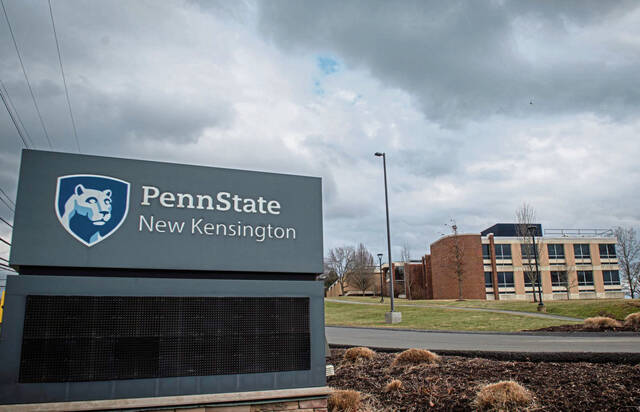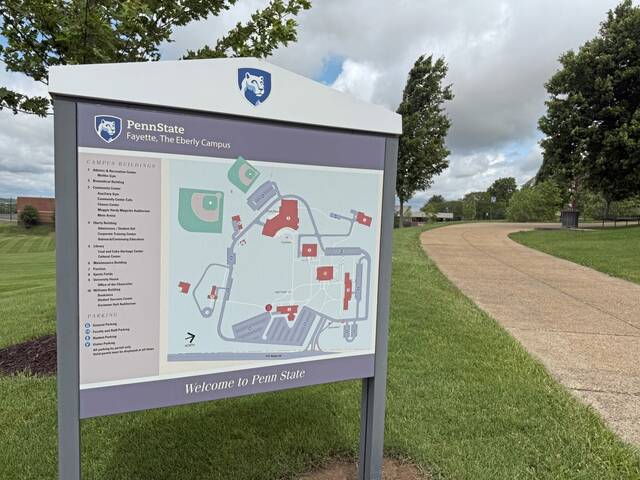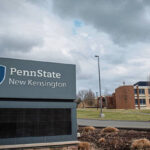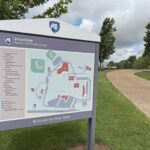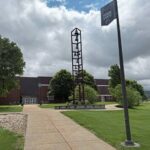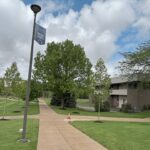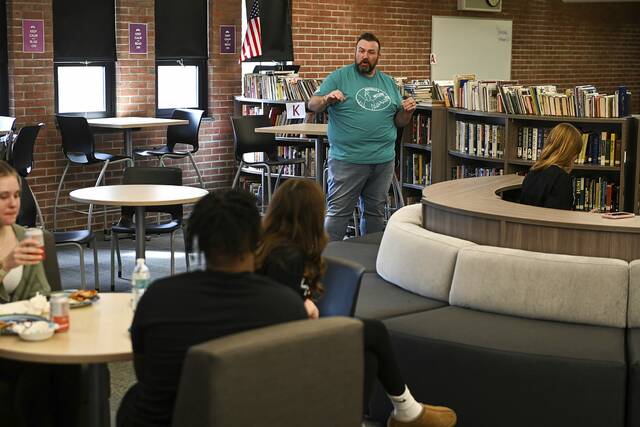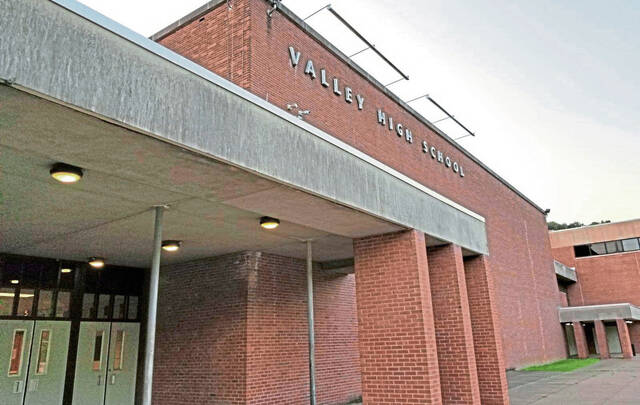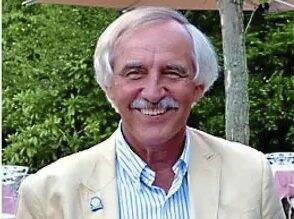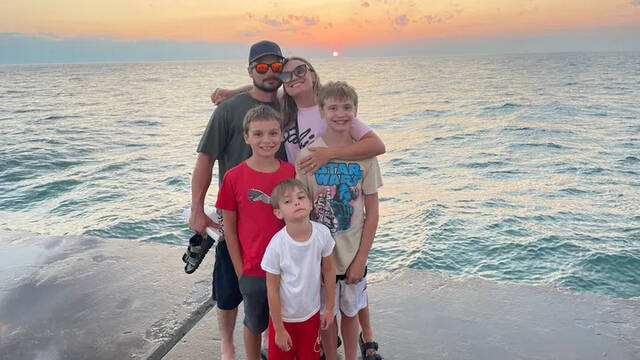Over the past two years, Darcy Holtzman worked with her fellow teachers at Burrell High School to provide more hands-on, real-world career experience for her students.
Part of that included visits to the Penn State New Kensington campus in Upper Burrell.
“Penn State New Kensington has been a huge help with our program,” she said. “To have such a close ally close will affect not just us, but the community as a whole.”
Citing enrollment declines, changing demographics, finances, a competitive higher education landscape and the opportunity to refocus resources, the Penn State Board of Trustees on Thursday voted 25-8 to close seven of its branch campuses, including its locations in Upper Burrell and Fayette.
Those campuses, along with DuBois, Mont Alto, Shenango, Wilkes-Barre and York, will close following the Spring 2027 semester as officials begin a two-year “wind-down” at the sites and begin work to “repurpose” the properties.
“They’re trying to do their best to maintain some of their programs,” said Burrell Superintendent Shannon Wagner, referencing PSNK-coordinated ABC Create technology education for area school districts.
“But it’s never going to be like it is now, having the campus up there.”
If not for branch campuses…
Trustees supporting the closure plan said their decision was brought on by years of financial difficulties and structural and enrollment declines.
Those opposed argued the recommendation was rushed, and that other avenues should have been explored before closing the campuses.
The two-hour meeting was livestreamed, with all trustees attending remotely. There was no opportunity for live public comment.
However, the board received 154 submitted comments before the meeting. They included:
• Cody Hmelar, an instructor at Penn State New Kensington who wrote about the impact the campus has on its students: “Most of my students are location bound and the world campus is not a suitable option for them. They already barely are able to make it to class due to the distance. (Having to attend) Greater Allegheny would encourage them to transfer to other universities or drop out of college entirely.”
• Meagan Carter, a graduate of Penn State New Kensington who said she studied there because it was close to home and affordable: “I benefited from the specialty programming that only PSNK offered and would not have made the professional achievements I have today were it not for PSNK.”
• Alexandra Reilly, a Penn State New Kensington student who plans to attend law school: “With this campus, I have been able to be financially independent and secure, remain close to family, find employment, and do so while still obtaining a Penn State degree. Like many others, I would not have the opportunity to pursue secondary education without this Commonwealth campus.”
While the outcome wasn’t a complete surprise to Penn State New Kensington English professor Andrea Adolph, the conversation among trustees was.
“My biggest takeaway is how little the board on the whole understands how the university operates,” Adolph said. “Those who were only citing the report from the president clearly had no ability to see it as the flawed document that it is. It includes many statements and data points that are incorrect or lack context, but that were selected to make a predetermined case.”
One example, Adolph said, is the report’s mention of a robust pathway for engineering majors as a strength at the Beaver campus — which will remain open — when, in reality, all campuses offer that programming, and it’s PSNK’s largest group among first- and second-year students.
“There are many other points that are dishonest through omission, and most trustees don’t have the chops to read between the lines of that report,” Adolph said. “They have not been served well by President Bendapudi’s administration, either, because they were asked to make a significant decision without honest information and clear direction.”
More to the story?
Adolph was asked about comments made during the meeting indicating graduation rates being low at the affected Commonwealth Campuses. For example, of a group of 134 students that started at PSNK in 2018, 45.5% “stopped out” and 52.2% graduated, according to Penn State.
Those rates are from students who started at a Commonwealth Campus as a first-time, full-time, bachelor’s degree-seeking student and graduated from any Penn State campus.
Adolph said there’s more to those numbers. They don’t always capture students who enter into two-year programs or transfer students, or students who start out in two-year programs but then switch to a four-year program.
“We also know that some local students might begin at our campus with a specific plan to transfer to other universities after saving money by commuting,” she said. “In those cases, we are offering what those students need.”
Adolph also said there are students who start at PSNK but are not prepared to succeed. Later, however, they return to Penn State or another college when they’re ready. She recalled a time when she was an administrator at PSNK and had to have an honest conversation with a student and his family over his poor academic performance.
They determined the student would be better off enrolling at a community college. Years later, the student found his footing and graduated from Duquesne University.
“There are probably thousands of stories like this one that illustrate how a small-campus environment can enable us to help students who would fall through the cracks otherwise,” Adolph said.
The board vote was upholding “an elitist perspective” of Penn State and of higher education itself, Adolph said.
“The attitude that our students can just take online classes or head off to another institution is not likely what they would see as a pathway for their own children,” she said.
Opportunities lost
New Kensington Mayor Tom Guzzo said he was disappointed with the outcome.
“While I understand the financial bottom-line issue, I can’t help but think of how this decision adversely affects the genuine opportunities for students from the A-K Valley to have access to an affordable and quality education,” Guzzo said.
“Often when decisions like this are made, it’s the people who don’t have a voice, who don’t have a seat at the table, who are the ones who are affected the most.”
Upper Burrell Supervisors Chairman Ross G. Walker III was at a loss for words when he learned Penn State New Kensington would officially close.
“I’m terribly upset,” Walker said. “That’s a bad decision. This is a change of course for Penn State.
“One of the many attributes to Upper Burrell Township is the fact we have Penn State. I don’t know what’s going to happen now.”
State Rep. Jill Cooper, R-Murrysville, said she was “deeply saddened” by the decision to close Penn State New Kensington.
“This choice feels rushed and leaves many questioning what could have been done differently,” Cooper said. “The Penn State New Kensington campus has been vital for first-generation students, non-traditional learners and those from underserved backgrounds, serving as an important steppingstone for many.”
Highlights of the campus include business initiatives like The Corner Launchbox and the Digital Foundry, contributing to New Kensington’s revitalization, Cooper said. Penn State officials said those outlets will continue to have a presence even in communities where a branch campus is closing.
“Those entities continue to be vital in our continued revitalization,” Guzzo said.
For the next two years, Adolph said PSNK professors are ready to double down on the quality of education to students.
“I know of no faculty member who is going to give any less than they have been,” she said. “Most of the questions I’m hearing from my colleagues involve the same concerns: How can we help our students? How can we make sure they know that they matter to the campus?”


